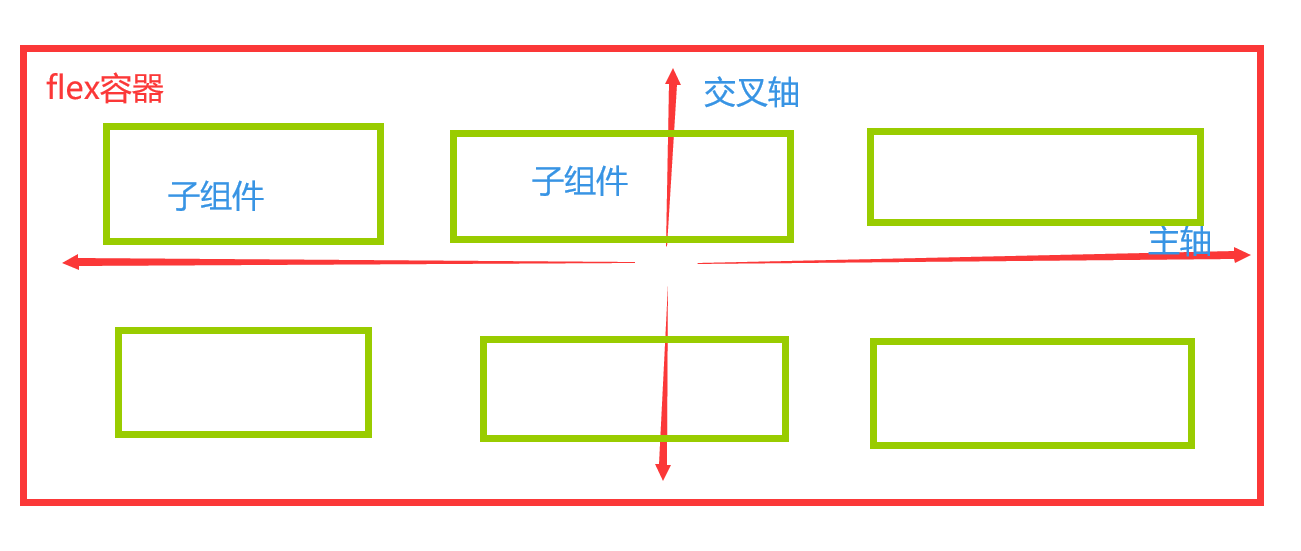本文主要是介绍Coursera: An Introduction to American Law 学习笔记 Week 02: Contract Law,希望对大家解决编程问题提供一定的参考价值,需要的开发者们随着小编来一起学习吧!
An Introduction to American Law

本文是 https://www.coursera.org/programs/career-training-for-nevadans-k7yhc/learn/american-law 这门课的学习笔记。
文章目录
- An Introduction to American Law
- Instructors
- Week 02: Contract Law
- Key Contract Law Terms
- Supplemental Reading
- Contract Law: Part 1
- Contract Law: Part 2
- Contract Law: Part 3
- Contract Law: Part 4
- Contract Quiz
- 法律英文
- 后记
Instructors
Anita Allen, Henry R. Silverman Professor of Law and Professor of Philosophy, Penn Law, University of Pennsylvania
Shyam Balganesh, Professor of Law, Penn Law, University of Pennsylvania
Stephen Morse, Ferdinand Wakeman Hubbell Professor of Law; Professor of Psychology and Law in Psychiatry; Associate Director, Center for Neuroscience & Society, Penn Law, University of Pennsylvania
Theodore Ruger, Dean and Bernard G. Segal Professor of Law, Penn Law, University of Pennsylvania
Tess Wilkinson-Ryan, Assistant Professor of Law and Psychology, Penn Law, University of Pennsylvania
Tobias Barrington Wolff, Professor of Law, Penn Law, University of Pennsylvania
Week 02: Contract Law
Contract law governs how promises between two individuals are enforced. Few areas of law impact our daily lives as much as contract law, and in this module you will gain a deeper understanding of what a contract is and what makes it enforceable. Professor Wilkinson-Ryan will address what constitutes a contract, why the law enforces them, the legal meanings of words in contracts, and the important requirement of consideration. Expectation damages, or the amount a court orders someone who breached a contract to pay will also be explored, all through hypothetical and real cases.
合同法规范如何执行两个人之间的承诺。很少有法律领域能像合同法一样对我们的日常生活产生如此大的影响,在本模块中,您将深入了解什么是合同以及合同的可执行性。威尔金森-瑞安教授将阐述合同的构成要素、法律强制执行合同的原因、合同中词语的法律含义以及对价的重要要求。此外,还将通过假设和真实案例探讨预期损害赔偿,即法院命令违反合同者支付的金额。
Key Contract Law Terms
Contract
An agreement creating obligations enforceable by law. The basic elements of a contract are mutual assent, consideration, capacity, and legality. In some states, the element of consideration can be satisfied by a valid substitute. Possible remedies for breach of contract include general damages, consequential damages, reliance damages, and specific performance. See more at http://www.law.cornell.edu/wex/contract
产生可依法强制执行的义务的协议。 合同的基本要素是相互同意、对价、行为能力和合法性。 在某些州,对价要素可以通过有效的替代物来满足。 对违约可能采取的补救措施包括一般损害赔偿、间接损害赔偿、信赖损害赔偿和特定履行。
Key Terms:
acceptance
Assent to the terms of an offer. Acceptance must be judged objectively, but can either be expressly stated or implied by the offeree’s conduct. To form a binding contract, acceptance should be relayed in a manner authorized, requested, or at least reasonably expected by the offeror.(http://www.law.cornell.edu/wex/acceptance)
assent
An intentional approval of known facts that are offered by another for acceptance; agreement; consent. (http://legal-dictionary.thefreedictionary.com/assent)
consideration
Something bargained for and received by a promisor from a promisee. Common types of consideration include real or personal property, a return promisee, some act, or a forbearance. Consideration or a valid substitute is required to have a contract. (http://www.law.cornell.edu/wex/consideration)
damages
A remedy in the form of monetary compensation to the harmed party (http://www.law.cornell.edu/wex/damages). General contract damages are damages that arise directly and inevitably from a breach of contract. In other words, those damages that would be theoretically suffered by every injured party under these circumstances.(http://www.law.cornell.edu/wex/general_damages)
expectation damages
Damages awarded when a party breaches a contract that are intended to put the injured party in as good of a position as if the breaching party fully performed its contractual duties. (http://www.law.cornell.edu/wex/expectation_damages)
mutual assent
Agreement by both parties to a contract. Mutual assent must be proven objectively, and is often established by showing an offer and acceptance (e.g., an offer to do X in exchange for Y, followed by an acceptance of that offer). (http://www.law.cornell.edu/wex/mutual_assent)
offer
A promise to do or refrain from doing something in exchange for something else. An offer must be stated and delivered in a way that would lead a reasonable person to expect a binding contract to arise from its acceptance. (http://www.law.cornell.edu/wex/offer)
promissory estoppel
The doctrine allowing recovery on a promise made without consideration when the reliance on the promise was reasonable, and the promisee relied to his or her detriment. (http://www.law.cornell.edu/wex/promissory_estoppel)
statute of frauds
A statute requiring certain contracts to be in writing and signed by the parties bound by the contract. The purpose is to prevent fraud and other injury. The most common types of contracts to which the statute applies are contracts that involve the sale or transfer of land, and contracts that cannot be completed within one year. (http://www.law.cornell.edu/wex/statute_of_frauds)
Supplemental Reading
Supplemental Reading
- “Contract Law: The Basics”
- “Contract Law 101”
- “Contract Law” (Encyclopedia Britannica)
- For more information, explore this website
- Excerpt from Westlaw’s Black Letter Law Outline: Contract
Contract Law: Part 1
[MUSIC] Hi, my name is Tess Wilkinson-Ryan and
I’m a law professor at the University of Pennsylvania Law School,
which was founded in 1790. I teach contract law and
law and psychology. I’m here to talk to you
about American contract law. Let’s start with what is a contract? A contract is a promissory agreement,
a set of promises, that people make to each other and
that the law recognizes and enforces. Contract law is the law of exchange, the legal rules that enforce agreements
to trade one thing for another.

I’m going to start by introducing two
foundational facts of contracting that both motivate and explain many of the
doctrines I’ll discuss in the next hour. I’ll call these facts mutual benefit and
time. First, voluntary exchanges
make people better off. Second, lots of mutually
beneficial exchanges take time. Let’s start with the idea
of mutual benefit.
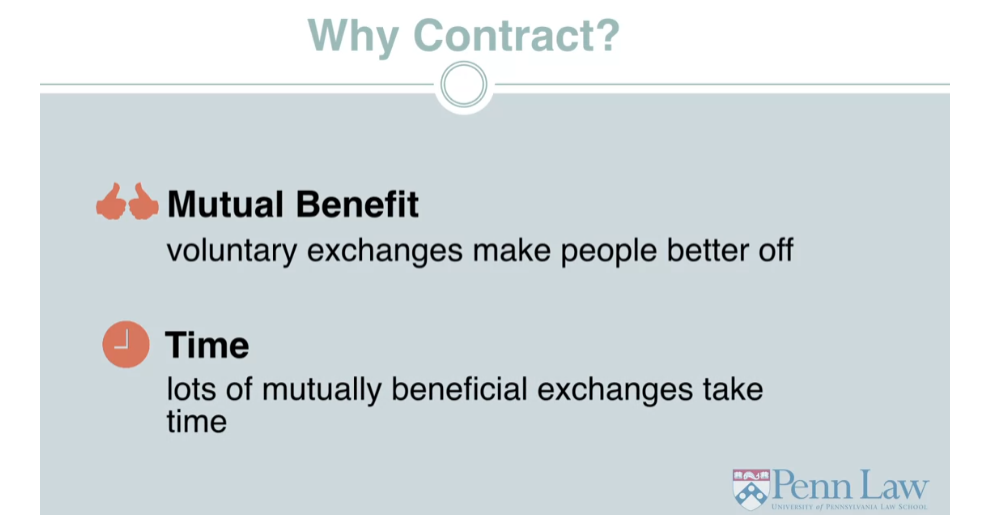
Why do people engage in exchange at all? They trade because it makes
them to a person better off. Take a simple example, imagine
a world in which I have an oven but no wheat, and
my neighbor has wheat, but no oven. Now imagine we contract for
an exchange of oven time for wheat. We both like this deal, right? Because we both want to eat bread. My neighbor cannot turn inedible raw
wheat into bread without a heat source. And though I have the tool to bake with,
I can’t make bread dough without wheat. This means that the exchange
has value just by trading, we have both gotten something we
wanted and didn’t have before.
If you’re inclined to
think in terms of utility, you can think of this deal as
creating utility or value. It’s not just redistributing goods, it’s actually creating
value where there was none. This holds true for
more common market exchanges. Money for goods or services. When I agree to pay the cable company
a monthly fee for Internet services, I might complain about the exorbitant
rates and the terrible service. And I may not feel like I really profited,
but in the end, I’d rather have internet and cable
than the money that they’re charging. So I part with the money and take
the Internet in return, making both me and the cable company better off
than we were before the deal. The fact of mutual benefit, gives us some
information about the subjects of contract law, that we don’t necessarily have about
the subjects of other kinds of law. We might know that on average,
people prefer laws against theft, or that generally speaking societies
function better when there are robust civil protections
of property interests. But we don’t know that a particular
claimant really preferred to be bound by the state’s criminal code. All else being equal, or
believed himself better off in a legal system that permitted his
neighbor to sue for trespass.
In contract though, we know that each of
the parties prefers this particular legal obligation, and
we know it because they chose it. Of course, this is not to say that every
party to a contract thinks the terms could not be improved, only if that
the parties preferred this contract, the available alternatives
including no contract.

Now we come to the second foundation
of contract which seems very simple on its face and that’s time. Contracts can create mutual benefit, but unfortunately contracts
cannot create time. Time turns out though,
to be an important motivating and complicating factor in
life of an exchange. So, take for example,
my wheat for oven time exchange. Now, one way that exchange could go, is
that every time my neighbor wants to bake bread, he shows up at my house with his
bag of wheat, and his bowl of bread dough. And if my oven is free, and I’m in need of
wheat, I take the wheat and put it away, and I put his dough in the oven for him. In fact, we don’t even need a contract, much less a law of contract to make
sure that this exchange happens. We don’t need a state enforcement
mechanism making us trade. We’ll just trade because we both want to.
But now imagine for a moment that my
neighbor is not going to have any wheat for me until after the next harvest,
but need to use my oven in the meantime. He says, I promise to deliver
the wheat to you next month, if you will let me use
your oven this weekend. This is still an exchange, and it still makes us both better off,
but now I, the oven owner, am worried. If I let my neighbor use my oven now, how can I be sure he’s going to
deliver the wheat as promised later? And this is where contract comes in.
The contract is the legal mechanism
to enforce my neighbor’s promise and give me the assurances I need to
participate in this beneficial exchange. It permits me to rely on the deal. In this way, contract law facilitates
the creation of mutually beneficial deals. Voluntary exchanges create value are good,
but there are lots of reasons that exchanges require planning or
multi step performances. In order to protect the party’s
investments in their deals, contract law enforces their
promises to one another. We will see that time
makes exchanges better. The ability, for example,
to plan to plant more wheat. To know in advance whether or not I’ll have Internet service on the day
that I need to send an important email. To be able to do what I promised at a ti,
at a convenient time, rather than a time that protects me against possible
exploitation by my counter party.
But of course,
time also makes exchanges worse, because it means that things can change. The world might change, with shifts in the market making the deal
actually a losing proposition for one of the parties, or the parties’ own
preferences and goals might change. So that they’re no longer interested or
benefited in the same way. When those things happen,
the law of contracts gives people an essentially revised
cost benefit analysis to do. They have to ask themselves whether
it’s worth it to go back on the deal, in a world in which they’ll have to
compensate the other party with money. Breach of contract is really about
what happens to a deal over time? We’re typically not talking about people
who have lied about their intentions to participate in a deal, but about
people who have changed their mind for one reason or another in time.
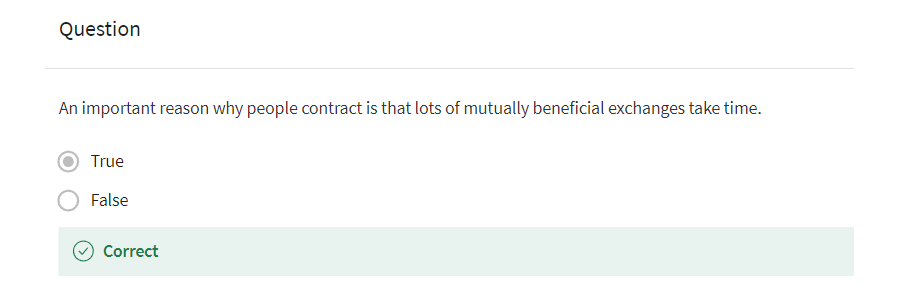
What I’ve said about benefit and
time, these are really universal. They explain why humans have promissory
exchange mechanisms like contracts. But as you know, the title of this talk is
An Introduction to American Contract Law. So let me say a couple of things to
sort of set up what’s distinctive about the evolution and role of American
contract law at a very broad level, and then I’ll show you how this
plays out in particular doctrines. American contract law enforces
the right of autonomous agents, that’s us, to bind our future selves.
In the common law tradition, the will
of the party in question is central. Common law courts are very liberal
about letting people choose to bind themselves to whatever deals they
want, while also protecting them from contractual liability they
haven’t explicitly undertaken. The second theme of American contract
law is the notion that the role of contracts in our society
is as an economic tool. The Subject of Contract
is economic exchanges. This might seem obvious, given what
I have said about beneficial trades. But we’ll see how narrowing
the analytical framework of contract, from the promissory
obligation broadly speaking, to one of economic exchange more narrowly
has serious doctrinal implications. So we have both an underlying principle
of autonomy and freedom of contract, but with legal enforcement essentially
confined to the commercial domain. [MUSIC]

Contract Law: Part 2
[MUSIC] From here on, I’ll structure my
talk by tracing how contract law approaches each stage in the life and
death of a deal. Which I’ll do with reference to
the examples of five seminal cases in contracts. I’ll start with how we know when we’ve got
a contract, move on to how we know what’s in the contract, identify which promises
the law cares about and which it does not, and then discuss what legal
enforcement of a contract looks like.

We start at the beginning, in the basic
case of a bi lateral contract we have two parties, each of whom
want something from the other. Who agree to a deal? In the traditional view, what was required
for contracts was a meeting of the minds. So, this is the straightforward case,
right? Joe has a leaky pipe in his kitchen,
he calls a plumber. The plumber comes out and
promises to fix it in return for a $100. Joe and the plumber look
one another in the eye and shake hands, their minds have met. At a single instant in time,
they both agreed and understood each other
to agree to the deal.
In fact, this meeting of the minds
happens even if the party’s agreements are staggered in time. So, let’s imagine, for a minute, that Joe solicits bids for his
plumbing work, via some online service. This plumber emails Joe at 9 AM, and
says, I’ll do it for $100, let me know. The plumber then waits by his computer,
ready and willing to get to work. Joe checks his email at 9:30,
sees the offer, and replies, it’s a deal. Their minds have still met there. At 9:30, the plumber was ready to go. Joe knew he was ready to go, because the plumber had made the offer and
hadn’t taken it back. So, when Joe agreed at 9:30,
there was a meeting of the minds. In fact though,
although it’s nice when it happens, meeting of the minds is not
always actually necessary.
So, now let’s make things
a bit more complicated, which we will do in the traditional way,
namely by getting everybody drunk. So in 1952 in a rural Virginia tavern,
A.H. Zehmer wrote this contract to sell his farm to an acquaintance, W.O.
Lucy, for $50,000. When Lucy tried to enforce the contract, Zehmer responded that when he wrote the
deal up, he was high as a Georgia pine, and that in fact, they were just a bunch
of two doggone drunks bluffing to see who could talk the biggest and
say the most.

Well, what now? Assume that Zimmer is telling the truth, that he was essentially just kidding the
whole time that he wrote that contract up. If that’s the case, then there is no real meeting of the minds
because when Lucy assented Zimmer did not. He was thinking to himself no contract. If we’re serious about contract as
voluntary obligations you might say, look, you can’t hold Zimmer to this
contract that he didn’t really want to be a part of. And that’s essentially what
Zimmer argued in court.
But here’s the problem. No one forced Zimmer to write and sign this contract to tell Lucy
that he was ready to sell the farm. Zimmer has voluntarily assumed the
obligations of this deal in so far as he has done the things that a person does to
indicate that they agree to something. The court says, mutual assent is of
course essential to a valid contract but the law imputes to a person
an intention corresponding to the reasonable meaning of his words and
acts. Which is to say, as long as Zimmer’s
communication, him writing and signing that deal, is reasonably interpreted
as assent then it it is assent. People are bound by the normal rules
of human discourse, promising and then saying you don’t mean it, is not
a way of getting around voluntariness.
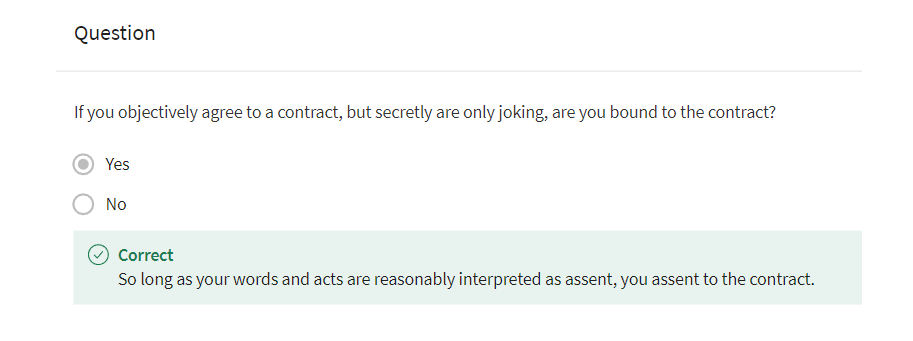
In American contract law,
this threshold question in whether or not the parties consented to be
legally bound is determinative. If you don’t have it,
you don’t have an action in contract. You can imagine situations,
I think, where this seems unfair. The parties are negotiating for
a long time, spending lots of money on research and legal fees, trying to work
out a deal that they both seem to want, and then one party quits negotiating
altogether with no obvious reason. In many civil law jurisdictions,
we might actually see recovery of damages based on the idea that one
of the parties is at fault for the failure to contract, which means
even in pre-contractual negotiations, the parties owe each
other some kind of duty.
But not in the US,
holding aside very rare recovery and promissory estoppel,
even reasonably relying on the prospect of a deal does not create
an action in contract in the US. In American law,
the availability of remedies and contract is essentially switched on
by the manifestations of assent. If you think about it,
the way we talk about assent and contract law is actually sort of odd. Because in regular conversation, usually
we don’t talk about agreeing, full stop. Usually, we talk about
agreeing to something. In fact though, contract doctrine
essentially deals with the form and the substance separately. That is,
we ask if there’s an agreement first and then we ask what there
was an agreement to. So, there’s a question of whether or not the parties manifested intent to
be legally bound to an agreement, and then a separate set of doctrines that
are about the content of the deal. And we talk about those documents as
questions of contract interpretation.
Interpretations of big deal because it
bears on assent on breach and on damages. If we know that Jack and Jill have agreed
to a joint irrigation venture, we can’t hold Jack liable for failure to perform
until we know exactly what he agreed to.

In American contract law,
we don’t have much in the way of background principles about
what the content of a contract should be. Mostly the court is only in the business
of enforcing the will of the parties. Interpretation tells us whether or
not the parties have made a deal, whether they have breached the deal, and
what the liability for breach should be. So, I’m going to make a somewhat unusual
claim that many of the doctrines in this area are actually very easy.
Rules about, for example, when to permit outside evidence to help
interpret a contract, when a court should supply terms that are missing from a
contract, how a court should fix mistakes. The various contract doctrines that
deal with these issues boil down to the courts attempt to create
a reasonable reconstruction of what the parties actually meant to do. And if that’s not possible, then what the parties would have done,
had they thought about it. The tough cases are going to be
where the parties appear to each have had different views
of what the contract meant. That is they were agreeing
to two different deals. If a court cares about enforcing
voluntary obligations and voluntary obligations only,
this puts the court in difficult position.
So, let’s compare two cases. In case number one, we have a contract for the sale of cotton being delivered
on board the ship Peerless. Only surprise, Peerless has a peer
indeed and it’s also named Peerless. So, what does the court do? The court says, if there’s no way to
prefer one Peerless ship to the other and which ship the cotton is on matters,
then there’s actually no contract. The parties agreed to
two different things, which means that they didn’t
actually assent to a single deal. Notice here that the court
ultimately decides to under enforce. So, this is a case in which nobody is
going to get the benefit of the bargain he thought he was making.
Rather than let one party be subjected
to a contract he didn’t agree to and had to reason to think he was agreeing to,
the court chooses not to enforce at all. 300 years later, we see the same argument
come up when two parties realized that they had different things in mind
when they made their contract for the sale of chicken. The seller of chicken thought
that they just meant chicken. The buyer thought that that they
meant young chicken, fryers or boilers, rather than stewing hens. The court said, actually, if you want
to use a word in a particular way that wouldn’t be obvious to your counter party,
the onus is on you to make that clear. This isn’t like Peerless, it seems to
be true that if the court is going to hold the buyer liable for a contract he
didn’t agree to, but it says, you had reason to know, that you were agreeing to
whatever kind of chicken came your way.
One of the functions of contract law, as I said earlier, is to permit
parties to rely on the deal over time. To protect a party, who’s made herself vulnerable by
trusting that the deal will happen. We see this come up in the context
of assent and interpretation too. In order to make deals with one another, we need to be able to use a common
language and each party needs to be able to trust that the other is
using language in a normal way. And the court can then be a bit more
expansive about holding the parties liable, given that they had
clearly manifested an intent to be legally bound but botched it enough that
now the court is forced to get involved. [MUSIC]
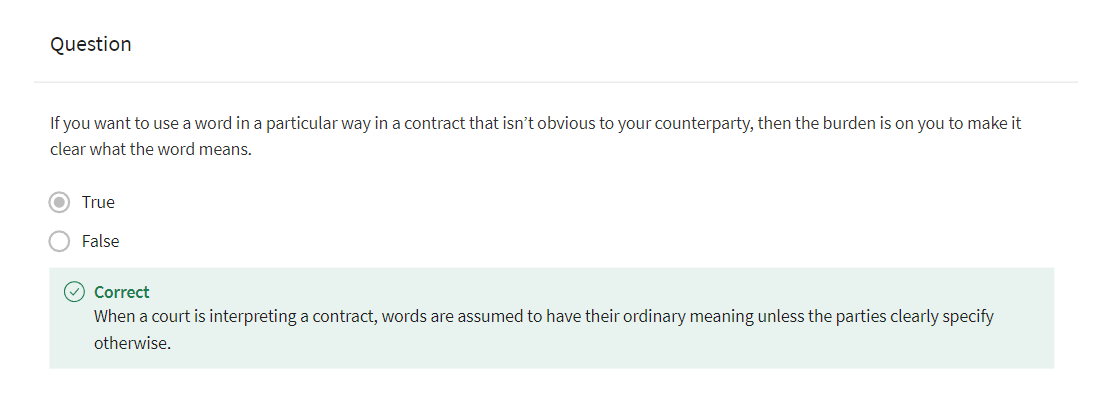
Contract Law: Part 3
[MUSIC] So we’ve talked now about
how parties make deals and how to figure out what’s in those deals. And now we’re going to
narrow the field a bit and think about which promises are actually
the subject of contract law. The realm of voluntary obligations
is actually pretty enormous, most of us have lots of voluntarily
assumed obligations, I think, that we don’t think are legally enforceable and we
don’t think should be legally enforceable. What this means is that the set
of promissory obligations is a lot bigger than legally
enforceable contracts.
So let’s start with what’s
sort of the easiest case, and that promises that might be real. So for hundreds of years, common law
courts have refused to enforce certain kinds of informally made deals,
because they’ve been worried about fraud. The resulting doctrine is
called the statute of frauds. And what it does is it require a writing
or a written document in transfers of land and in sales of goods over
a threshold dollar amount. In these cases, what the court says to the
parties is look, if you’re serious about this deal, you have to do something to
show us your seriousness, we’re not going to enforce your agreement to sell
a house, if you didn’t get it in writing. What’s frustrating about this
doctrine to students and scholars is that it draws
a very bright line. It says, even when we have great
evidence that the parties made a real oral contract, these are cases
in which we won’t enforce for failure of a written document.

So this is a case where the rule might
actually be a pretty bad fit for it’s stated purpose, but
the purpose itself, which is weeding out contracts that weren’t
actually made is pretty uncontroversial. Okay.
So the court wants to avoid enforcing fake promises.
Next up is social promises. Almost nowhere will courts be willing
to get involved with social exchanges. Aside from more sort of
philosophical justifications, there are costs to involving
the state in private disputes. Costs to the state and also arguably
costs to sort of the social fabric. So let’s say for a minute that I’m going
to a gathering at my sister’s house and I write her a note that morning promising
that I will be over early enough to help her make dinner, this is a promise. But let me assure you that contract
law has zero interest in this promise, no matter how formally I write that note. Maybe my sister will levy
informal interpersonal sanctions? But I certainly cannot be taken to
small claims court if I wander in after the other guests have arrived, and find
a frozen pizza thawing on the counter. Whatever you might say about
my inconsiderate behavior, I surely didn’t intend to
be legally bound here. Contract law does not enforce this
kind of purely social promise.
Okay. So now we come to the most controversial
constraint on contract enforcement. American contract law explicitly
limits its jurisdiction to bargained-for exchanges, and this is
called the doctrine of consideration. One way to understand this is to think
about what I said at the start of this talk, that contract law is special, because every party to a contract is
made better off by that contract.
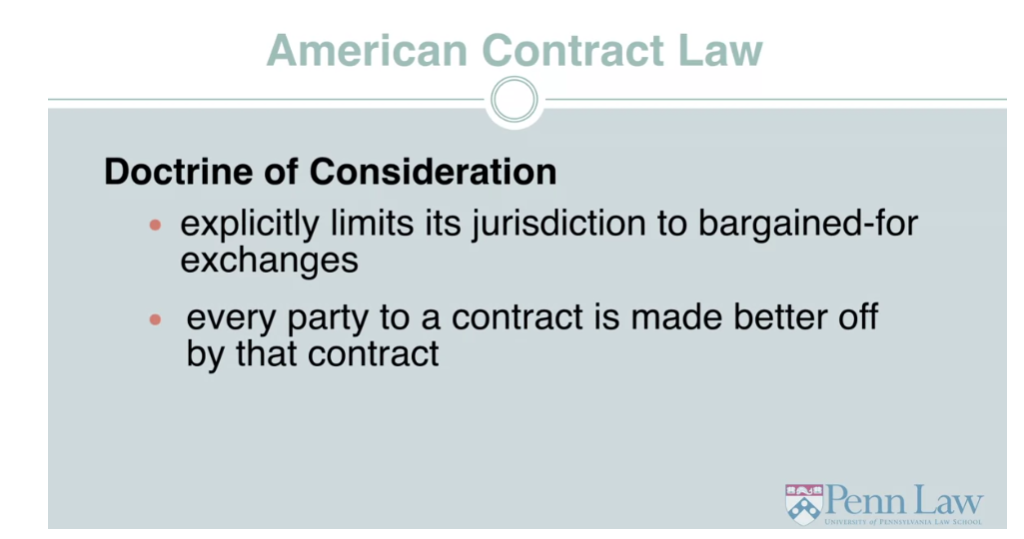
In a promise to give a gift, we have
a recipient whose surely better off, but a gift giver who gets nothing,
who, who is worse off. That promise to give a gift is
unenforceable under the doctrine of consideration. Of course, thinking about this
in terms of who’s better off and who is worse off,
doesn’t obviously give us the answer, because it sure seems like if I choose to
give money away it’s because there’s some measure of utility by which I’m
better off with less money. I feel better, right, there’s a warm glow. So a better way to think about
what’s going on here is that there’s a line between promises we want
people to be able to take back and those we want the law to get involved in. And one way to draw that
line is to say well, what interest does the political
system have in enforcing contracts? Is it to make people behave morally? Is it to regulate
interpersonal relationships? No. It’s essentially about commerce,
about economic relationships, and one way to identify those contracts
is by looking for true exchanges. We want to enforce deals in
which each party is in it for what they’re getting out of it. What this means that we enforce
exchanges in bargains and notably we don’t enforce gifts.
Most of the time,
it’s very easy to find consideration. If I promised to sell my car
to my neighbor for $10,000, we know that I’m giving my car because
I want what the neighbor is offering. And that my neighbor is giving up the
money, because what she wants is a car. But some times, things get messier. So let’s take the famous
1891 case of Hamer v Sidway. In this case, an uncle was worried
about his wayward adolescent nephew. Wishing to bring his nephew into line, the uncle declared that if the nephew
would abstain from drinking, smoking and gambling, until he reached age 21,
the uncle would reward him with $5000.

And lo and behold,
the nephew stopped drinking and smoking and gambling for
the next six years. Well, when the nephew brought a claim,
the court had to figure out whether this is an exchange, or
if it’s just a gift with strings attached. An exchange is enforceful, and
a gift with strings attached, is not. There’s an argument here about whether
the uncle really gets anything out of this deal, or whether the nephew
really gives anything up. After all, surely the nephew is better
off after six years of sobriety, even with out the money. But the court says no,
this is not what matters. What matters, is, literally,
the considerations. What motivated these parties? If their ascent is induced by
the promise of the other party’s performance, that’s enough. We might think that the uncle doesn’t get
much out of his nephew’s good behavior. But as long as he’s paying money in
order to get his nephew to perform, to abstain from drinking and
gambling we’re okay.
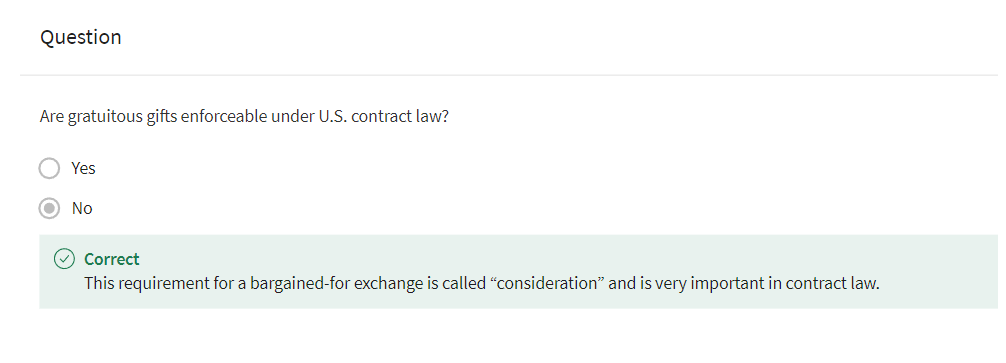
What’s troubling I think is that the
bargain for exchange in Hamer v Sidway, sure doesn’t feel like it’s
central to American economic life. On the other hand things like
promises of a bonus for work for the employee has already promised to do,
this kind of promise that sure feels like a valuable economic tool is going
to run into consideration trouble.
So take the following, a firm has employed
someone who’s near retirement age. The boss sends the employee a letter
thanking her for her years of service and promising for the first time to pay
her a bonus on retirement by way of recognition for
her contribution to the firm. No strings attached. The boss writes this letter is legal
proof of our agreement to pay you a retirement bonus, it’s signed and
let’s say even say it was even notarized. So we have ample proof that
the boss wanted this to be an legally enforceable agreement. The employee’s very happy, she stays
in her job looking forward in sort of a non-specific way to having
a slightly more luxurious retirement. So we check now on a set. Did the boss agree to this deal? Yes. Did the employee? Certainly. Can we be sure that the boss
intended it to be legally bound? Absolutely. So can she take this letter to
court to enforce the contract? No. This contract is a promise,
but it’s not an exchange. And contract law is about bargains. The doctrine of consideration
is unique to the common law. States that have modeled their own
law of contracts on principles of established common and civil law traditions have uniformly chosen
the civilian approach, declining to adopt a doctrine that’s as complicated
as it is infrequently applicable. [MUSIC]
Contract Law: Part 4
[MUSIC] Most contracts courses in US law schools,
actually begin the semester at the end of the contract, with damages for
breach of contract. Although this usually strikes
students as unnecessarily confusing, there are good reasons for it.
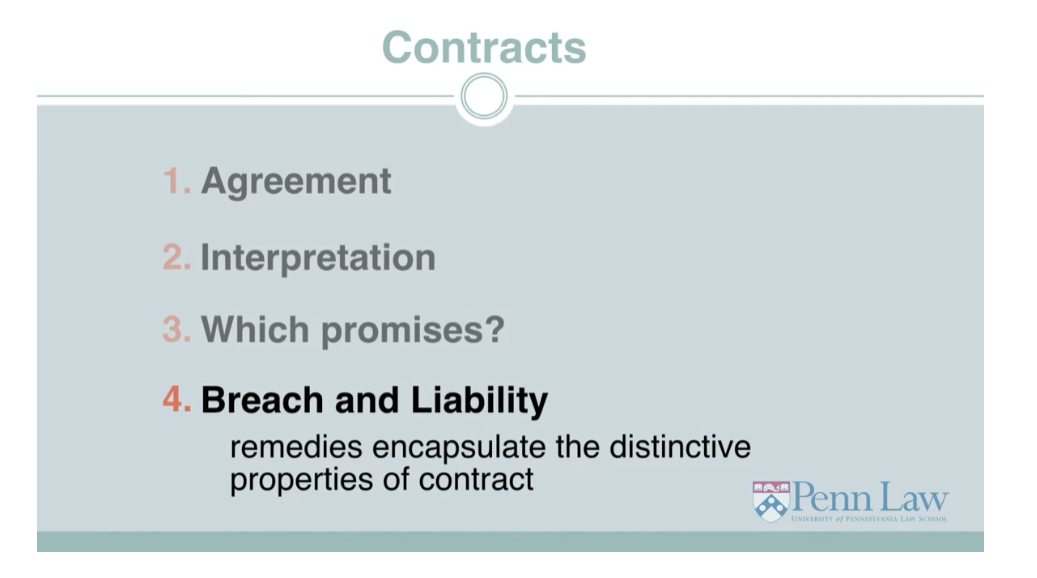
Namely that remedies for breach of contract, encapsulate
the distinctive properties of contract. In order to hold parties liable period, we’re going to need to know that they
assented, and what they assented to. The court is going to want
to know what the deal is, because we want to make sure we’re
holding people to the right contract. And only by knowing what the deal was,
do we know how to compensate for the deal’s failure.
So, let’s start with an example to help
illustrate one of the central rules of American contract law,
which is the rule of expectation damages. This is the case of Hawkins vs McGee.
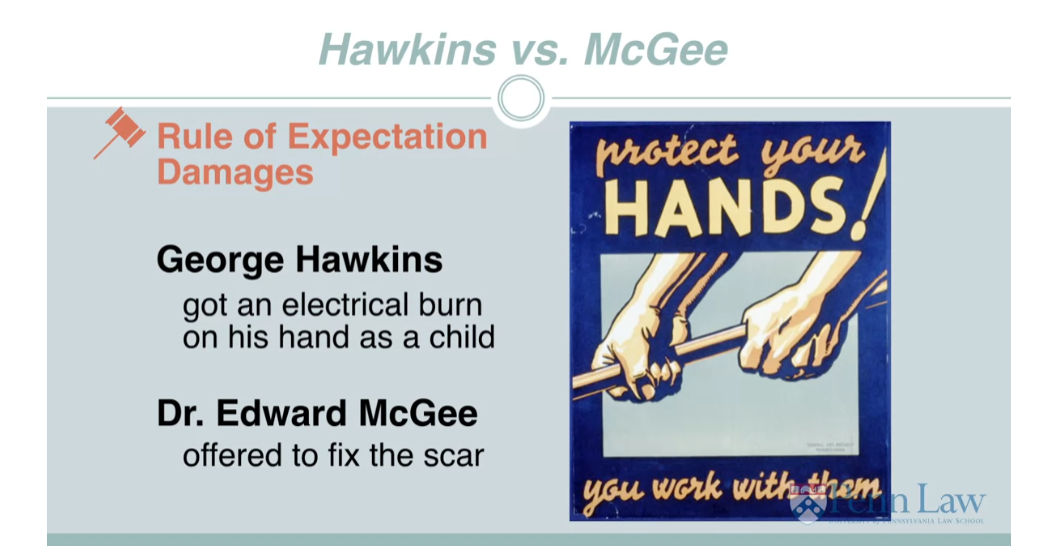
George Hawkins, got an electrical
burn on his right hand as a child. And the result was that he had a scar,
noticeable enough to trouble him and his parents. Their family doctor, Edward McGee, noticed the scar while treating George’s
younger brother for pneumonia, and evidently got very excited, because while
in Europe during the first World War, he had seen successful skin grafts, and
thought George was a perfect test case. So, for a few years, he would periodically
offer the Hawkins’ that he could fix George’s hand, and that he could graph
skin from George’s chest, onto his hand, and create 100% perfect hand. Well, to give you a sense
of how things turned out, the case is colloquially
known as the Hairy Hand case. So, whether, because it was
a bad idea at the outset, or because the doctor couldn’t
execute the surgery skillfully, George Hawkins wound up with
a disfigured and disabled right hand. Okay, so we have a contract. George Hawkins promised to pay money, and
Dr. McGee promised him a perfect hand. Then we have a breach of contract. George Hawkins paid the money, but Dr.
McGee gave him a deformed hand. So, how do we compensate George Hawkins? Well, Dr. McGee argues that he should be
made to give George’s money back, and compensate him for any harm done. Let’s pause for a minute,
and change the hypothetical.
Let’s say for a minute, that George was
going over to Dr. McGee’s house for dinner, and the doctor accidentally
slammed George’s hand in the door, causing George significant pain and
disfigurement. Well now, Dr. McGee has to
compensate George for sure, right? With the goal being to put George
back in the position he was before the doctor injured him. Okay, so
what’s different about these cases? The contract case, and
the hand in the door case? What’s different is
the relevant counterfactual. A counterfactual is just the state of
the world that we’re comparing the current situation to. The counterfactual in
the hand in the door case, is that George’s hand doesn’t get slammed. The counterfactual in the surgery case,
is that the surgery doesn’t fail, and George gets a brand new hand. What Dr. McGee wanted, was to pay George the difference
between the hand he ended up with, something horrifying, and the hand he
had before, something uncomfortable.
But Dr. McGee voluntarily entered into
a contract, to give George a perfect hand. So, the court says, what we want to
do here, is to put George in the position he would have been in,
if the contract had been performed, which means paying him the difference
between his current horrifying hand, and a perfect hand, and
that’s going to be a much bigger number.

In contract, the remedy of expectation
damages is the default remedy. And it puts the non-breaching party, like George, in the position he would have
been in, had the contract been performed. What surprises many students of contract
though, is not necessarily that damage is measured, but the preference for
damages over specific performance. Specific performance means making
the parties do what they said they were going to do.
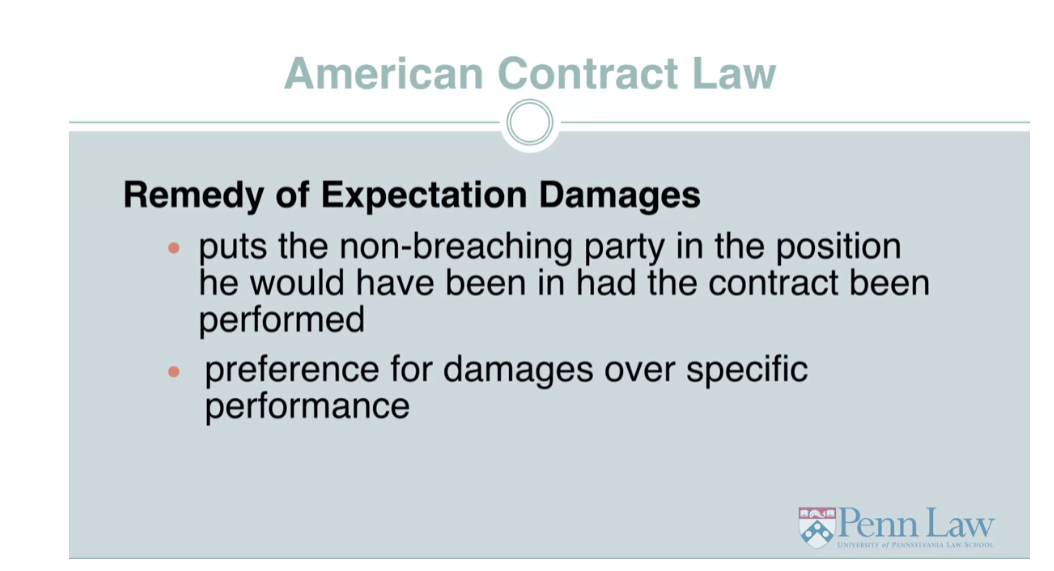
With the exception of real
property transfers, so land sales, American contract doctrine
severely restricts the ability of the parties to actually get
the thing they wanted from the deal. So, on the one hand, American courts are
very focused on getting the number right, making sure that the damages award
reflects exactly the amount of commitment, that the parties actually intended. But we don’t hold parties to their actual
promises, perhaps underscoring again, that what we’re doing here is
enforcing economic exchange. Where it’s reasonable to think that
the benefit can be easily expressed in dollars, rather than enforcing promises.

Indeed, in American courts, the idea that
expectation damages provide the right incentives to the parties,
has been highly influential. The notion that some breaches
are actually efficient, that they leave the breacher better off,
than he was in the contract, and the non-breaching party no worse off,
than she was under the contract. This has influenced the normative
attitude of courts, toward breach, toward a view that breaching and paying expectation damages,
is essentially a morally neutral choice. This is in keeping,
I think, with the trajectory of American contract law,
beginning with the Industrial Revolution, with the realization that
executory contracts, contracts for stuff you’re going to do later,
are economic tools, financial instruments. This insight leads me finally,
to the modern challenge, in which this financial tool increasingly mediates the
relationships between consumers and firms. So, I’d like to use my last
few words here, to flag for you, what’s perhaps the most important
modern challenge to contract doctrine. And that’s the phenomenon
of unread fine print.
In the United States, there are many contracts that are not
the object of the common law of contract. Insurance contracts
are regulated separately. Employment contracts
are part of labor law. Securities contracts
are regulated by Article nine of the Uniform Commercial Code. But other countries have
taken a different, or at least additional approach to
taxonomizing contracts, based not so much on what the contract is,
so much as who the parties are. Other countries have included form
contracts as a separately regulated area of contract. So, let’s just step back a minute.
In a general matter, we can think about contracts as
belonging to three categories. The first is contracts
between individuals. The deal that I make with someone who’s
selling a used car on Craigslist. The agreement between Dr.
McGee and George Hawkins. The sale of a house from one
homeowner to another, or an uncle’s promise to pay his
nephew not to be a wastrel. These deals are sort of the easiest
ones to fit into a contract paradigm, because we have actual people who
negotiate and draft an agreement. And since these are humans with cognition,
we know what it means, when we talk about their motivations and
their intentions. The problem,
is that these are the deals for which contract doctrine is
arguably the least relevant. Because these are the deals least
likely to be resolved by courts, for lots of reasons. First, these deals are just
few on the ground. Unless you’re Warren Buffet, I just don’t
think you’re drafting that many contracts. The financial stakes in these contracts
are quite low typically, meaning that the costs of bringing an action is often
going to swamp the expected value of litigation. And in the meantime, the social and psychological stakes of deals between
individuals, can often be quite high, so that parties often prefer to figure things
out informally in a way that’s the least destructive to their relationships,
to their standings in the community.
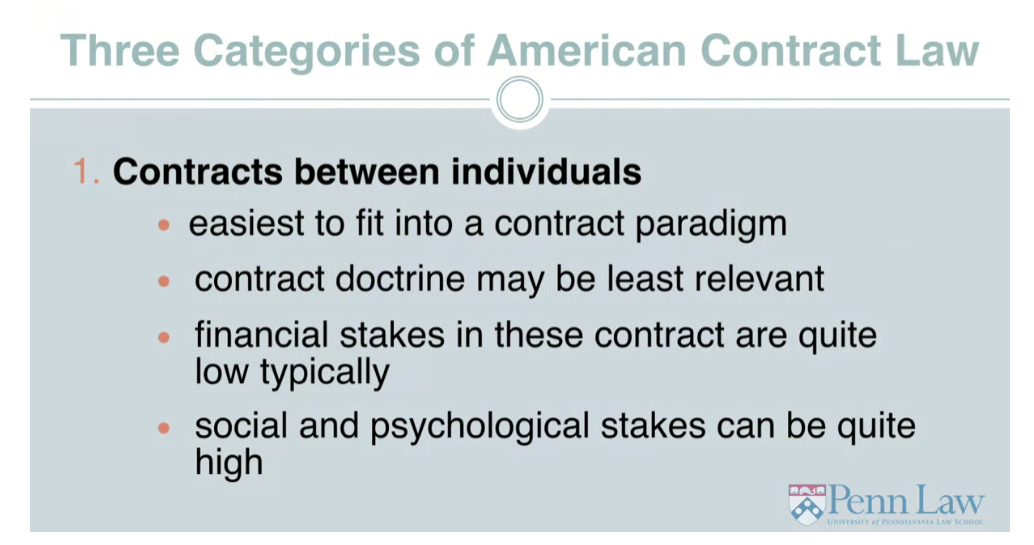
Some scholars would argue that American
contract law, really isn’t made for these cases anyhow. What it’s really about
is commercial deals. And indeed, this should resonate with
my description of development of modern contract law, in the context
of the Industrial Revolution. When we have two commercial actors,
whether its a farmer and a bodega, or Apple and Google making a deal, we have
a nice robust role for contract doctrine. Because we’re going to be talking about
parties who are represented by counsel, meaning that they,
they’re going to know what the rules are. I’m talking about deals
that are big enough, that the prospect of legal enforcement has
real effects on how the parties draft and then perform their deals. Gets a little bit trickier, to talk about
things like a meeting of the minds, when the actors are entities
rather than humans. But there are always humans involved,
of course. So, it’s just a matter of locating the relevant humans. And also we can rely on doctrines like
objective assent, to make clear and easier, how we understand what
it means to, for example, agree. So, now for the third category of
contract, the category that most of us have the most experience with, and that’s
contracts between individuals and firms. In other words, the form contracts that
you have with AT&T and Comcast, and iTunes, Facebook, Vanguard,
Chase, and Visa, et cetera. These are take it or leave it deals,
between consumers and companies. And by a simple head count,
these account for the vast majority of contracts
active at any given moment.
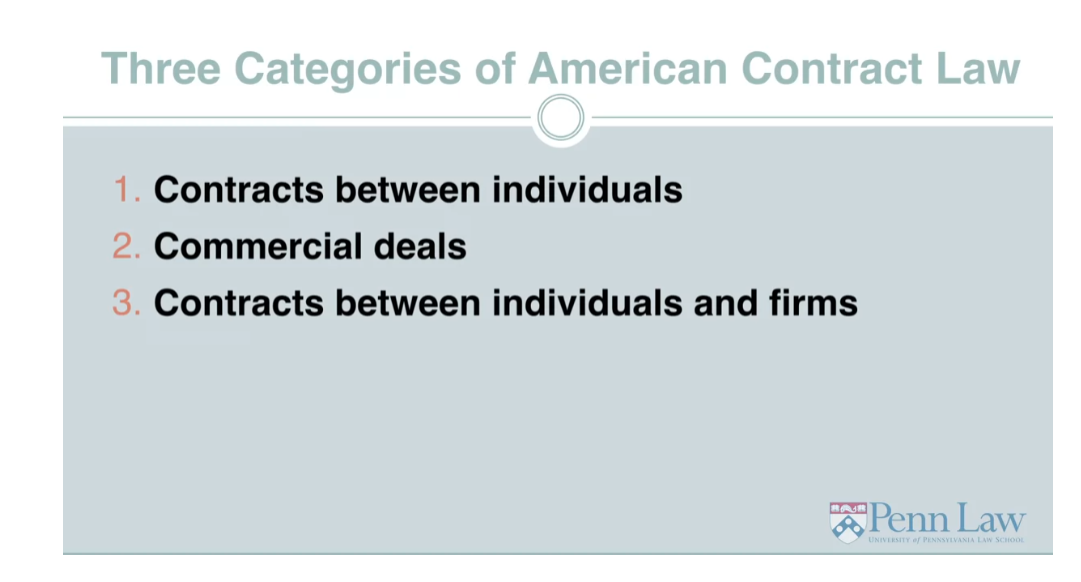
But these contracts pose real
challenges for contract doctrine, and the consequences of how we deal with these
challenges are increasingly serious, as consumer contracts are increasingly
central to how individuals participate in American economic life. The normal ways that we talk about
negotiation and promise, and assent, they fit only uneasily,
in a form contracts context, where everyone acknowledges that only
the drafting party, only the company, knows what’s in the terms,
because most consumers don’t read them. Other jurisdictions, including civil
law countries as well as the UK, have taken legislative action to
constrain the content of form contracts. But American courts, and
legislatures tend to view substantive restrictions on contract
terms as sort of overly paternalistic. Preferring to let the market weed
out unfavorable or unfair terms. As we watch this area unfold over time,
we’ll see, both how the norms and patterns of everyday commercial interactions
push contract law to adapt, but also how increasing contractualization, affects the
American economic and social discourse. [MUSIC]

Contract Quiz


B. The modern doctrine of assent is about what the parties manifested to one another, not their secret intentions. In this case, Jane assented when she verbally agreed and shook Caleb’s hands, because those are actions reasonably interpreted by Caleb as Jane’s agreement to the deal.
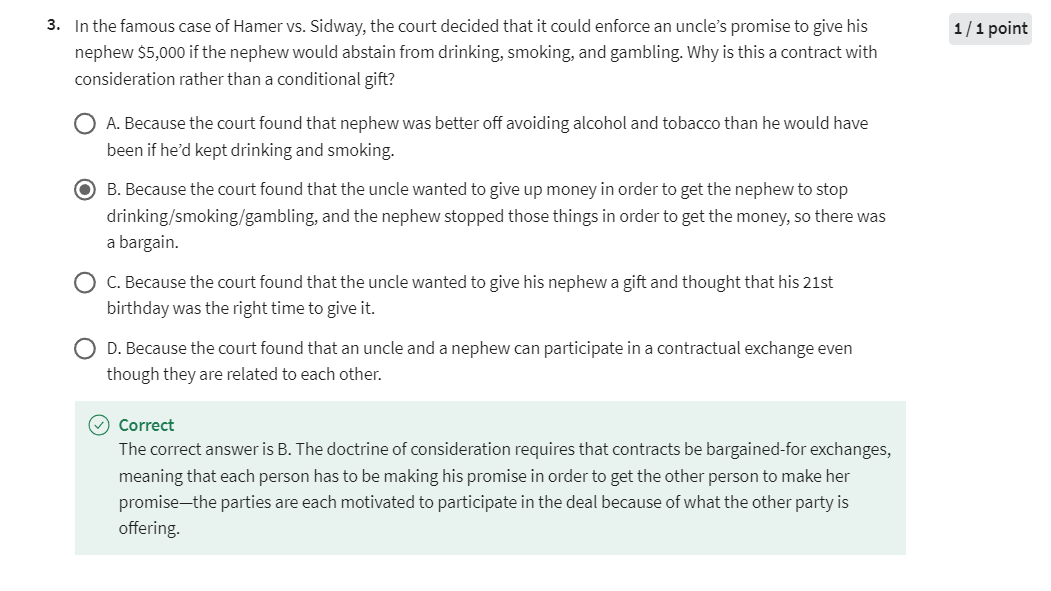

D. In contracts, the usual rule is that the non-breaching party gets money damages in an amount sufficient to put him the position he would have been in had the contract been fulfilled. In this case, if the contract were fulfilled, the homeowner would have no mess and a fixed pipe, so the plumber has to pay him not only the cost of cleaning up the mess but also of actually fixing the pipe as promised. 在合同中,通常的规则是,非违约方获得金钱损害赔偿,赔偿金额应足以使其处于履行合同情况下应有的地位。
法律英文
obligations :义务
doctrine:美 [ˈdɑːktrɪn] 教义,官方声明
breach of contract:违约
promissory:美 [ˈprɑməˌsɔri] 约定的;承诺的
A contract is a promissory agreement, a set of promises, that people make to each other and that the law recognizes and enforces. 合同是一种约定的协议,是人们相互做出的一系列承诺,是法律认可和强制执行的。
voluntary:美 [ˈvɑːlənteri] 自愿的
voluntary exchanges make people better off 自愿交换使人们过得更好
exorbitant:美 [ɪɡˈzɔːrbɪtənt] 过高的
oven:美 [ˈʌvn] 烤箱
dough:美 [doʊ] 生面团
bind:法律约束
American contract law enforces the right of autonomous agents to bind our future selves. 美国合同法强制执行自主代理人约束我们未来自我的权利。
enforcement:执行,实施
confine:美 [kənˈfaɪn] 限制,局限
So we have both an underlying principle of autonomy and freedom of contract, but with legal enforcement essentially confined to the commercial domain. 因此,我们既有合同自主和自由的基本原则,但法律执行基本上仅限于商业领域。
plumber: 美 [ˈplʌmər] 水管工
Joe has a leaky pipe in his kitchen, he calls a plumber. 乔的厨房水管漏水,他打电话给水管工。
tavern:美 [ˈtævərn] 酒馆,客栈
acquaintance:美 [əˈkweɪntəns] 认识的人,熟人,泛泛之交
assent:美 [əˈsent] 赞成,同意
jurisdiction:美 [ˌdʒʊrɪsˈdɪkʃn] 司法权;裁判权;司法;权限;
estoppel:美 [əˈstɑpəl] 禁止反悔,禁止翻供
promissory estoppel:美 [ˈprɑməˌsɔri əˈstɑpəl] “promissory estoppel”是一种法律原则,通常用于合同法领域。它指的是当一方做出了明确的承诺,导致另一方在行为或决策上产生了合理的依赖,从而使得原承诺方不能反悔或撤销承诺的情况。在这种情况下,法律可能会阻止原承诺方否认承诺或采取反对依赖方利益的行动。 promissory estoppel通常用于解决当事人之间没有正式合同但有明确承诺的情况,以确保公平和正义。
remedy:美 [ˈremədi] 补救,法定补偿
manifestations:美 [ˌmænəfeˈsteɪʃənz] 表现,显现
In American law, the availability of remedies and contract is essentially switched on by the manifestations of assent. 在美国法律中,补救措施和合同的有效性基本上取决于同意的表现。
So, there’s a question of whether or not the parties manifested intent to be legally bound to an agreement, and then a separate set of doctrines that are about the content of the deal. 因此,有一个问题是,双方是否表明了受协议法律约束的意图,然后是关于交易内容的一套单独的理论。
cotton:美 [ˈkɑːtn] 棉花
legally enforceable contracts: 可依法执行的合同
statute of frauds: 反欺诈法;防止欺诈法
wayward:美 [ˈweɪwərd] 任性的
an uncle was worried about his wayward adolescent nephew. 一个叔叔很担心他任性的青春期侄子。
abstain:美 [əbˈsteɪn] 克制,戒除,放弃
abstain from drinking, smoking and gambling
a gift with strings attached:"a gift with strings attached"是一个英语习语,意思是赠送礼物时附带了一些条件或限制。这表示接受礼物的人在享受礼物时必须满足某些要求或遵守特定的规定。这种情况下,接受礼物可能并不完全是无条件的,而是附带了一些约束或限制。
consideration:对价。在合同法中,“对价”指的是承诺人从受让人那里获得的并且是通过讨价还价得到的东西。对价可以采取各种形式,包括实物或个人财产、回报承诺、某种行为或者是不采取行动(忍让)。简而言之,对价就是每一方为对方的承诺所给予或同意给予的东西。在合同法中,对价或者有效的替代品是确立具有法律约束力的合同所必需的。这确保了双方都提供了具有价值的东西,从而使得合同具有约束力。
colloquially:美 [kə’loʊkwɪrlɪ] 用白话地;用通俗语地;口语地
default:不履行,违约
non-breaching party:非违约方
the remedy of expectation damages is the default remedy. And it puts the non-breaching party, like George, in the position he would have been in, had the contract been performed. 预期损害赔偿的救济是违约救济。这将像乔治一样的非违约方置于合同履行时他本应处于的地位。
specific performance:特定履行;强制履行
在法律领域,specific performance指的是法院对合同中某一方当事人作出的具体执行裁定。这意味着法院要求违约方履行其合同义务,而不是通过支付赔偿金或损失赔偿来解决违约。通常情况下,specific performance适用于合同中涉及独特或独一无二的物品或服务的情况,因为赔偿金无法完全弥补损失。例如,如果某人违约未按合同约定出售房产,法院可能会裁定要求该人执行合同,即出售房产。specific performance通常被视为一种有力的法律手段,以确保合同当事人履行其承诺。
damages award: 损害赔偿金
American courts are very focused on getting the number right, making sure that the damages award reflects exactly the amount of commitment, that the parties actually intended 美国法院非常注重获得正确的数字,确保损害赔偿裁决准确反映当事人实际意图的承诺金额
financial instruments:金融商品;金融工具;金融手段
economic tools, financial instruments 经济工具、金融工具
taxonomy:美 [tækˈsɑnəmi] 分类学,分类 注意发音
stake:美 [steɪk] “stake” 的中文意思是 “赌注”、“利害关系” 或 “股份”。
litigation:美 [ˌlɪtɪˈɡeɪʃn] 诉讼;起诉;打官司
swamp:美 [swɑːmp] 淹没,压倒
The financial stakes in these contracts are quite low typically, meaning that the costs of bringing an action is often going to swamp the expected value of litigation:这些合同的财务利益通常相当低,这意味着提起诉讼的成本往往会超过诉讼的预期价值。
后记
2024年4月24日15点59分开始学习第二周的课程:American Contract Law。2024年4月25日15点41分完成第二周的学习。两天大概花费时间为2h。
这篇关于Coursera: An Introduction to American Law 学习笔记 Week 02: Contract Law的文章就介绍到这儿,希望我们推荐的文章对编程师们有所帮助!







